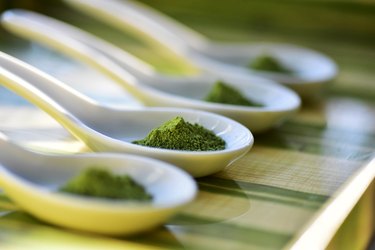
Matcha, sencha, gyokuro — whichever green tea you enjoy, they are all bursting with health benefits. However, there are some instances when you should avoid drinking green tea or other caffeinated beverages. Here's what you need to know about green tea and antibiotics.
Tip
It is important to discuss consuming green tea and antibiotics together with your health care professional. Certain antibiotics may be affected by the ingestion of caffeine and green tea.
Video of the Day
Green Tea and Antibiotics
While green tea is healthy in moderation for most people, if you are taking prescription antibiotics, it is essential to be aware of potential side effects from drinking green tea while taking antibiotics.
Video of the Day
A particular type of antibiotics called quinolones interferes with how readily your body can break down caffeine. If you are drinking green tea and antibiotics have been prescribed to you, this can amplify the typical effects that you can get from caffeine. Side effects include headaches, an increase in heart rate, jitteriness and others, according to the U.S. National Library of Medicine.
Popular antibiotics that reduce your body's ability to break down caffeine quickly are ciprofloxacin, enoxacin, norfloxacin, moxifloxacin, levofloxacin, trovafloxacin, grepafloxacin, sparfloxacin and more.
Furthermore, more recent research has shown that green tea may affect the gastrointestinal absorption of amoxicillin. An August 2019 study on rats published in BMC Pharmacology and Toxicology reveals that the concentrations of amoxicillin are significantly decreased when taken with the green tea. Although the research was conducted on rats, if you are concerned about green tea and amoxicillin interaction, you should speak to your health care professional.
How Green Tea Fights Infections
Interestingly, green tea extract can fight a common type of urinary tract infection (UTI) caused by E. coli. These bacteria cause approximately 80 to 90 percent of all UTIs, according to a June 2013 analysis published in Frontiers in Microbiology. The report found that a compound in green tea extract called EGC shows antimicrobial effects on E. coli.
Another January 2015 article published in the Journal of Traditional and Complementary Medicine shows similar results. The researchers explain that green tea shows promising antimicrobial effects on E. coli, but further human studies are needed.
You mustn't try to use green tea as an antibiotic at home. Speak to your health care provider before beginning any supplements, such as green tea extract. However, if you are prone to UTIs, drinking green tea may be beneficial as a preventative measure, as long as your health care provider approves.
Read more: What Is the Best Green Tea?
Drink Green Tea For Health
As long as you are healthy, drinking green tea in reasonable amounts can provide myriad health benefits. The Cleveland Clinic says that drinking green tea is associated with lower risks of coronary artery disease and could be beneficial for skin health because of its antioxidant content.
The University of Rochester Medical Center explains that green tea extract contains potent antioxidant polyphenols, including the highly active epigallocatechin gallate. They say that the polyphenols in green tea especially may help reduce the risk and slow the development of certain cancers.
Green tea is often touted as a remedy for obesity and overweight. However, the science is still out on this effect. The American Academy of Family Physicians states that several small clinical trials have looked into the possibility of green tea as a remedy for weight loss. The results are mixed, and no conclusive persistent effects have been proven.
- U.S. National Library of Medicine: "Black Tea"
- BMC Pharmacology and Toxicology: "Effect of Green Tea on the Gastrointestinal Absorption of Amoxicillin in Rats"
- Journal of Traditional and Complementary Medicine: "Effects of Green Tea on Escherichia Coli as a Uropathogen"
- The Cleveland Clinic: "Green Tea Extract: Pros and Cons for Energy, Weight Loss and More"
- University of Rochester Medical Center: "Green Tea Extract"
- The American Academy of Family Physicians: "Green Tea: Potential Health Benefits"
- Frontiers in Microbiology: "Green Tea as an Effective Antimicrobial for Urinary Tract Infections Caused by Escherichia Coli"